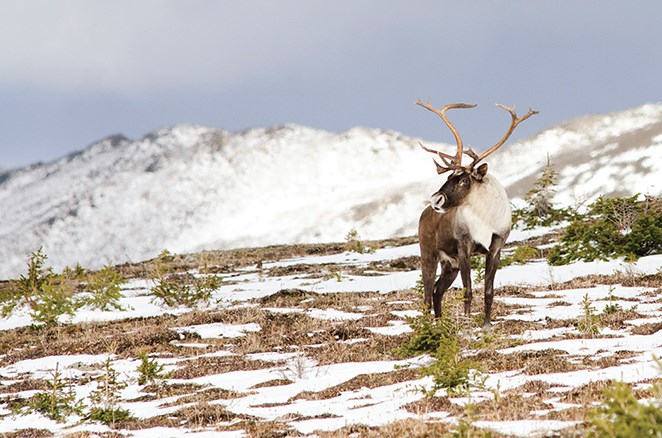
Joanne McQuarrie, Local Journalism Initiative Reporter | [email protected]
Conservation groups and one recreation group are urging backcountry skiers to keep out of Tonquin Valley to protect the dwindling caribou.
The groups also want Parks Canada to keep Tonquin backcountry closed to human access all snow season, instead of opening it Feb. 16 to skiers and lodging operations, and re-assess and reduce impacts to caribou from Tonquin summer-fall backcountry access.
In addition, the Alpine Club of Canada has voluntarily suspended bookings at its Tonquin backcountry Wates-Gibson hut for the entire winter.
“The Alpine Club of Canada promotes responsible and sustainable recreational use of wilderness areas,” says Lael Parrott, VP for Access and Environment of the Alpine Club of Canada. “We have asked our members to lead by example and choose to go backcountry skiing outside of Jasper National Park’s Tonquin backcountry, and we ask Parks Canada to keep Tonquin backcountry closed all snow season for caribou.”
Along with the Alpine Club, the advocating groups include the Alberta Wilderness Association (AWA), Canadian Parks and Wilderness Society (CPAWS) Northern Alberta Chapter, David Suzuki Foundation and Yellowstone to Yukon Conservation Initiative (Y2Y).
“Backcountry ski and snowmobile supply routes bring noise, packed trails and people into high quality caribou habitat,” a joint release stated.
It noted that this activity can stress the caribou, displace them from the best habitat and make it easier for wolves to gain access and hunt them.
As well, caribou can perceive touring skiers as increasing predation risk. This can cause caribou to be stressed in the presence of backcountry skiers and to avoid good habitat areas where people have been.
“Wolves can quickly respond to packed trails created by backcountry users,” the release added. “In the winter of 2015, two people hiked on foot into an area closed for caribou in Jasper National Park; Parks staff reported that wolves used those tracks within two days after they were made. In the worst scenarios, wolf use of packed trails can lead to caribou kills.”
Caribou are highly sensitive to human presence and are close to extinction in Jasper National Park. Parks Canada said the Maligne herd was last seen in 2018 and is considered extirpated.
Although the largest in Jasper National Park, the Tonquin herd is estimated to have fewer than 60 animals left.
“We estimate there are <10 reproductive females in the Tonquin and, therefore, that all South Jasper caribou herds are at a high risk of imminent extirpation,” Parks Canada stated in a Dec. 14 report.
“Although caribou may still exist in South Jasper for years, herds will ultimately continue to decline to extirpation.”
The advocate groups say evidence from Jasper’s recently-extirpated Maligne herd, as well as other available scientific research, indicates more should be done to limit Tonquin access.
“That decision for the mid-February opening was a compromise between recreational interests and analysis… of what would be safe for caribou,” said Gillian Chow-Fraser, CPAWS Northern Alberta.
Chow-Fraser said she’s hopeful the conservation groups and Parks Canada can work together to save the caribou from extinction and with the priority to conserve ecological integrity, all stops need to be pulled out.
“There’s not much time left,” added Carolyn Campbell with the AWA. “We feel that allowing winter access on Feb. 16 forward further endangers the already-critically low numbers of the largest caribou herd left in south Jasper.
“There’s really strong evidence to keep it closed to human access all winter long, all snow season. It’s important especially for pregnant cows to not have that added stress. Caribou need truly remote areas.”
Campbell described the Feb. 16 opening as “a compromise for a few human interests.”
“It’s time for those compromises to end in a national park, for an endangered species,” she added. “We are watching them decline. It’s getting worse.”



